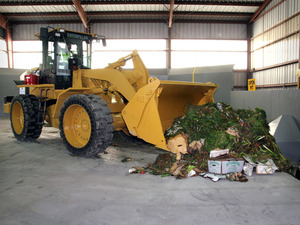![]()
![]()
Recent NPR Stories on Food and Agricultural Waste
|
|
"Food Recycling Law A Hit In San Francisco" by David Gorn, Morning Edition, 21 October 2009 San Francisco's new law requires recycling food waste. |
|
|
"Book Lays Bare The West's Wasteful Food Ways" by Renee Montagne, Morning Edition, 21 October 2009 Author Tristram Stuart talks about his new book, Waste: Uncovering the Global Food Scandal. |
Agricultural Waste
Even small farms, even organic small farms committed to composting, waste food. Some of this waste is due to the vagaries of the weather. Some is due to unpredictable markets. And some is inherent in farming itself.
Organic farms (especially smaller ones) may re-use this waste through composting or converting it to animal feed. Commercial farmers may till excess crops back into the soil, where it may or may not improve the soil for future crops. But unless raised specifically for these purposes, the excess crops are still considered "food waste".
Food Waste
Food crops can be wasted in the fields, in the warehouse, in the store, in transportation, and at home.
In 1998, the U.S. Department of Agriculture estimated that 27 percent of all food grown is never
eaten. A study at the University of Arizona
done for the USDA five years ago put the estimate at 40 to 50 percent.
[Download Summary of Report ![]() 128KB.]
The USDA is currently updating its studies.
128KB.]
The USDA is currently updating its studies.
Jonathan Bloom has been blogging about food waste since 2006 at wastedfood.com.
Government Responses
The Clinton administration attempted to focus public attention on food waste. The Department of Agriculture under Secretary Dan Glickman promoted a Food Recovery and Gleaning Initiative. That focus disappeared during the following Bush administration. Will it be re-set under President Obama?
![]()

![]()

![]()

Partially Funded by the California Council for the Humanities, UC Santa Cruz, and INTA - TrainingWeal.


